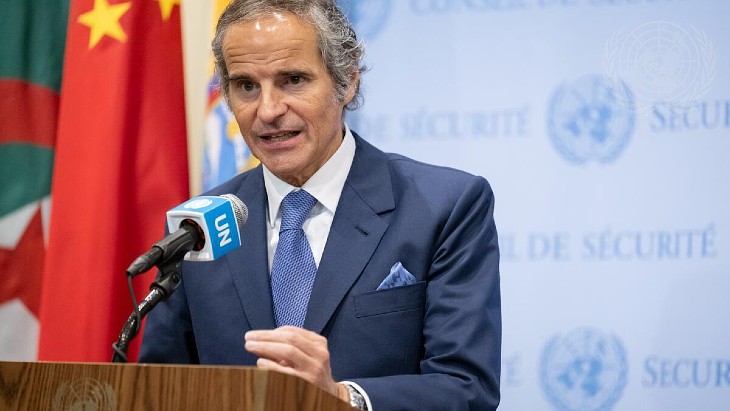Grossi to visit Zaporizhzhia, warns against complacency
26 January 2024
International Atomic Energy Agency Director General Rafael Mariano Grossi says he will visit Ukraine, Russia and the Zaporizhzhia nuclear power plant in the next two weeks, with one aim being to ascertain long-term plans for the plant, such as restarting units.
 The IAEA director general at the UN (Image: UN Photo/Manuel Elías)
The IAEA director general at the UN (Image: UN Photo/Manuel Elías)Grossi, briefing the United Nations Security Council for the sixth time on the situation in Ukraine, said he planned to visit the occupied plant and Kiev and Moscow within the next two weeks. It will enable him to assess the situation at the plant first-hand, eight months after his last visit.
He said: "Although the plant has not been shelled for a considerable time, significant military activities continue in the region and sometimes in the vicinity of the facility, with our staff reporting rockets flying overhead close to the plant, thereby putting at risk the physical integrity of the plant."
There were also continuing concerns about off-site power supplies. "There have now been eight occasions when the site lost all off-site power and had to rely on emergency diesel generators, the last line of defence against a nuclear accident, to provide essential cooling of the reactor and spent fuel," he said.
In a media briefing later he said the power supply loss might be the result of deliberate action, but it was often not possible to find the exact reason for the loss of power supply as it could be the result of something happening hundreds of kilometres away.
He said that during his visit he would be meeting the Russian operators to discuss more about the cooling water situation at the plant - wells have been dug since the destruction of the Kakhovka dam last year led to the decline of the previous water supply system. The IAEA also says that with the units not working, the cooling water temperature has dropped and ice has been seen in parts of the ponds.
Grossi added that during his talks there he would try to "ascertain their longer term plans for the plant - are they going to attempt to restart one or more reactors, and why and how - these are issues which have profound nuclear safety implications".
He warned against complacency, telling the UN: "A nuclear accident has not yet happened. This is true. But complacency could still lead us to tragedy. That should not happen. We must do everything in our power to minimise the risk that it does." Grossi added that the unpredictable nature of war meant you could not talk in terms of "a trend of things stabilising ... you can have a good week and then you have a blackout, you can have a good week and then a drone aims at the plant".
There had been times when the IAEA experts, a team of which has been at the plant since September 2022, "have not had timely access to some areas of the plant - sometimes for many months" and although no indications have been seen that the five core safety principles have been breached, "nevertheless, in line with the evolving situation, the agency needs to have timely access to all areas of the ZNPP of significance for nuclear safety and security" to monitor observance. The principles include the core ones that the facility should not be fired at, or from, or be used as a base for heavy military equipment.
There was continuing concern for the staffing levels at the plant, which has been under Russian military control since March 2022. More broadly, he said "we have put together a programme of health care assistance including through equipment and psychological support for all Ukrainian nuclear workers".
Researched and written by World Nuclear News
No comments:
Post a Comment